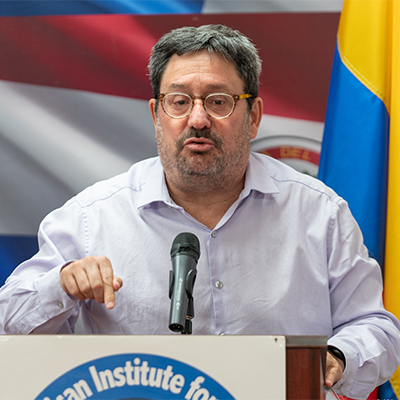Between pancreatic or brain cancer

By: Francisco Santos - 17/07/2025
Share:
My good friend Ramón Pérez-Maura, a great Spanish journalist formerly with the newspaper ABC and now with the most successful digital portal in Spain, El Debate, wrote after a long conversation we had about the two heads of government of his country, Spain, and mine, Colombia. His conclusion: they're the same. I don't think so; Gustavo Petro is far worse than Pedro Sánchez, although the two, as they say in my country, are not exactly the same.
Petro and Sánchez have many things in common. They lie with complete shamelessness and aplomb. In this, they are very consistent, as lying is part of their way of conducting politics and gaining allies. The corruption that surrounds them directly includes their family and political entourage, and the truth matters little to them. Sánchez, for years, turned a blind eye and only now supposedly realizes that his closest advisors are corrupt officials of the highest order. Petro, since he was a senator—there is a video of him counting bills more than a decade ago—has been involved in corruption scandals such as the garbage truck scandal at the mayor's office or the theft of hundreds of millions of dollars from the Irrigation Management Unit (UNGRD), not to mention the millions of dollars from the mafia and the major corrupt contractors who entered his presidential campaign.
Both are also experts at buying allies one way or another. Of course, it's not by convincing them with their speeches or their proposals. It's with state money that they buy this "governability." Sánchez surrenders national unity and agrees to all kinds of perks with the nationalist "allies" who blackmail him, and as long as they're paid, they look the other way on the issue of corruption, or they speak out, but they remain firm, collecting.
Petro bought off the presidents of the Senate and the House of Representatives with money stolen from the UNGRD (National Union of Deputies), and he has the most corrupt politicians in Colombian history around him. This government has elevated corruption to systemic levels with the approval, or, to be generous, a blind eye, of the head of state. The top figures, with recordings and all kinds of public information about their corruption, remain at his side, although some have already resigned, others have escaped, and a very few others are in prison. The truth is that, for both Sánchez and Petro, the end justifies the means, regardless of corruption or institutional destruction.
The latter is also a common characteristic of Petro and Sánchez. In Spain, the head of government is destroying institutionality everywhere, and the reform of the judicial system is the final blow. In this, he resembles the Mexican populist leader, Andrés Manuel López Obrador, and his puppet, Claudia Sheinbaum. Petro tried to turn himself into the Constitutional Court and Congress by illegally imposing his decree calling for a referendum that had been rejected by the Senate. Now he's playing with a Constituent Assembly that he wants to call at all costs. Petro and Sánchez are weakening institutionality and the separation of public powers, as they have the same ultimate goal: to remain in power.
And do they protect and safeguard the country's dignity? Certainly not. Sánchez, during a state visit to Petro, decorated him after the latter, in a direct insult to Spain, said, in the same Congress of Deputies, that "we must free ourselves from the Spanish yoke" and accused the Spanish of being a people of murderers and slavers.
Petro is also not an example in defending Colombia's dignity. His outbursts abroad—most recently, French Prime Minister Emmanuel Macron put him in his place—are now part of his agenda every time he boards a plane. It's not just when he disappears, as happened in Paris, we already know why, as his former foreign minister said, but especially in Colombia, where his disappearances are commonplace. It remains to be seen what he went to Manta to do; there are many people working on this issue, but it certainly wasn't for good. In Colombia, we're already used to it, and the sad thing is that the same thing is already happening abroad. "Here comes the crazy one, run away," many people think in the countries he visits. Don't worry, he only has one year left.
When we discussed the issue, I was convinced Petro was much worse. Pérez-Maura says no, because at least Petro justifies his corruption and authoritarianism with an ideology. No, Ramón, the ideology of both is power, first to attain power and then to stay. They don't care about their legacy; they only see power; they don't care about dignity; they only want to stay in power; they don't care about democracy, power, power, power, and corruption is their modus operandi.
In the past, when the choice had to be made between two bad scenarios, it was said it was between AIDS and cancer. Fortunately, today AIDS is a disease that doesn't kill. That's why choosing between Sánchez and Petro is like having to choose between pancreatic cancer, with a 5-year survival rate of 11 percent, or glioblastoma in the brain, with a 6 percent survival rate.
That's how Colombia and Spain are. And the opposition? It's in trouble, but that's another topic.
«The opinions published herein are the sole responsibility of its author».